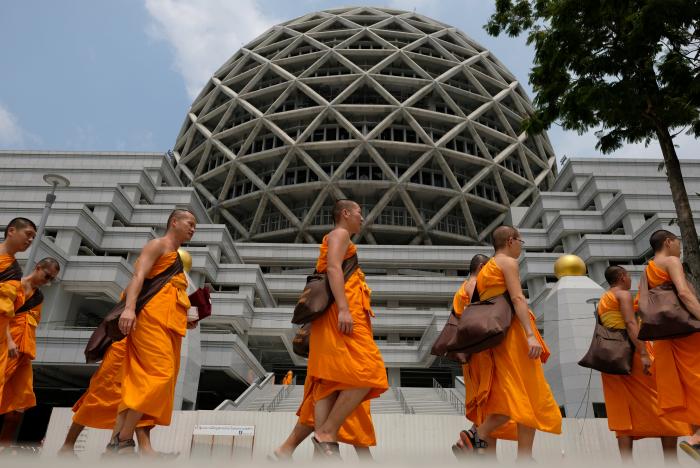Thailand’s military government is working on a law to help regulate Buddhism, officials say, giving the junta far more say over the religion, which has so far eluded its control.
The proposed bill, which has not been made public, would appear to significantly reduce the say of the Sangha Supreme Council, Buddhism’s governing body in Thailand.
A source within the government who did not wish to be named said the bill would set up a new committee that would set policies to “support and protect Buddhism,” though it wouldn’t touch on religious practices.
The bill would give monks chosen by the Sangha Council only three of the 27 seats on the committee. Other seats would go to the prime minister, police chief, a number of other senior officials as well as experts on Buddhism, members of Buddhist universities and representatives of Buddhist groups chosen by the prime minister, the source said.
“The bill does not ‘support’, but forces monks to obey and stay under state governance, which is inappropriate,” Phra Metha Winairos, deputy dean of Mahamakut Buddhist University, said. “This state interference will downgrade religion.”
The proposed law comes amid a swirl of controversies around a religion professed by 95 percent of Thais, and with most opposition to army rule neutralised since a 2014 coup.
While police have lifted a three-week siege of the giant Dhammakaya temple north of Bangkok, the temple’s defiance of attempts to arrest its former abbot in a money laundering case has highlighted the limit of state authority over monks.
The draft of the new bill is being reviewed by the Sangha Supreme Council, said the head of the National Office of Buddhism.
No member of the council of elder monks was available for comment.
“This bill will benefit monks and help spread Buddhism,” said Pongporn Pramsaneh, the recently appointed former detective who now heads the government office that handles Buddhist affairs. He declined to give details about the bill.
WANING INFLUENCE
There are already indications the Sangha Council’s influence has been weakened.
Last year, the junta rejected the name put forward by the council to be the new Supreme Patriarch of Buddhism, an abbot who had ties with the Dhammakaya temple and who had been under investigation over a scam involving luxury cars.
The military-appointed parliament then granted new King Maha Vajiralongkorn the power to pick a chief monk himself.
Pongporn at the Buddhist affairs office said the renewed push on the bill had nothing to do with the Dhammakaya temple, which frustrated an attempt by thousands of police this month to search for its former abbot, Phra Dhammachayo.
Critics of the temple say it is sympathetic to the “red shirt” movement of ousted prime minister Thaksin Shinawatra, which the temple denies.
Paiboon Nititawan, a former junta advisor who wants even greater regulation of Buddhism, said if the bill was enacted, “problems like Dhammakaya will be suppressed.”
“Monks looking to violate monastic codes or wrongly exploit religion will be suppressed,” he said.
VOW OF OBEDIENCE?
Religious scandal is nothing new in Thailand, which has 40,000 temples and more than 300,000 monks. Reports of sex, drugs and improper financial dealings are frequent.
The proposed committee under the new bill would set policies to improve secular affairs – though not Buddhist religious practices.
That could potentially help the Sangha tackle persistent problems, said Buddhism expert Montree Sirarojananan from Thammasat University in Bangkok. But he said a committee dominated by government officials could also be abused.
“A knife in the hands of a military government tends to be used as a weapon,” he said.
The bill did not include any measures for state control over the finances of temples which, according to a 2014 study, get an estimated THB120 billion a year in donations, the government source said.
The bill would still need approval from the cabinet and the legislative assembly.
It would also need to be signed off by King Vajiralongkorn. After appointing a conservative as Supreme Patriarch in February, the king then approved the junta’s request to strip the Dhammakaya temple’s former abbot of his monastic titles.
Aomsin Cheewapruek, Minister in the Prime Minister’s Office, said the government would enact the bill before the next general election, which is not expected until well into 2018.




